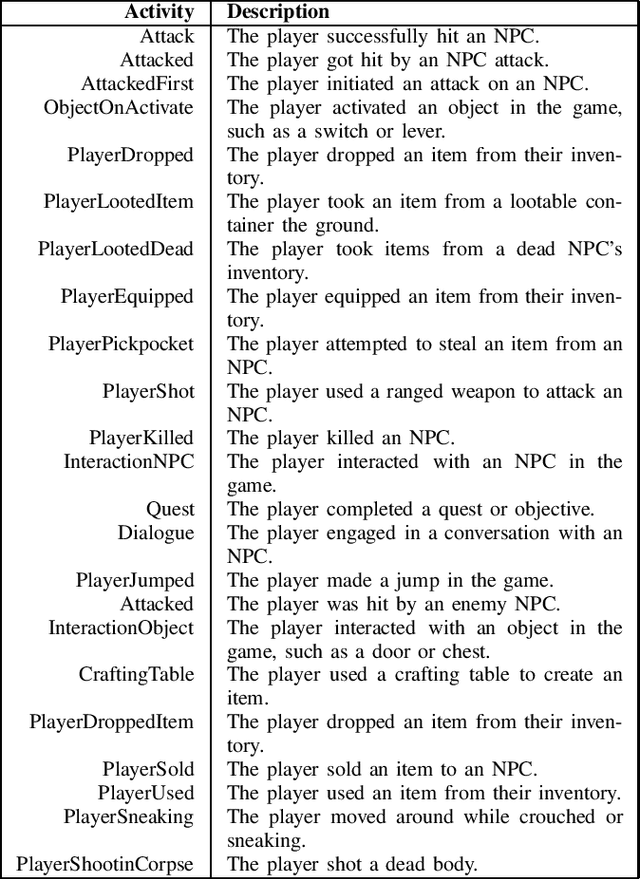Johannes Pfau
Assessing the Impact of Personality on Affective States from Video Game Communication
Sep 22, 2023Abstract:Individual differences in personality determine our preferences, traits and values, which should similarly hold for the way we express ourselves. With current advancements and transformations of technology and society, text-based communication has become ordinary and often even surpasses natural voice conversations -- with distinct challenges and opportunities. In this exploratory work, we investigate the impact of personality on the tendency how players of a team-based collaborative alternate reality game express themselves affectively. We collected chat logs from eleven players over two weeks, labeled them according to their affective state, and assessed the connection between them and the five-factor personality domains and facets. After applying multi-linear regression, we found a series of reasonable correlations between (combinations of) personality variables and expressed affect -- as increased confusion could be predicted by lower self-competence (C1), personal annoyance by vulnerability to stress (N6) and expressing anger occured more often in players that are prone to anxiety (N1), less humble and modest (A5), think less carefully before they act (C6) and have higher neuroticism (N). Expanding the data set, sample size and input modalities in subsequent work, we aim to confirm these findings and reveal even more interesting connections that could inform affective computing and games user research equally.
Modeling Player Personality Factors from In-Game Behavior and Affective Expression
Aug 27, 2023


Abstract:Developing a thorough understanding of the target audience (and/or single individuals) is a key factor for success - which is exceptionally important and powerful for the domain of video games that can not only benefit from informed decision making during development, but ideally even tailor game content, difficulty and player experience while playing. The granular assessment of individual personality and differences across players is a particularly difficult endeavor, given the highly variant human nature, disagreement in psychological background models and because of the effortful data collection that most often builds upon long, time-consuming and deterrent questionnaires. In this work, we explore possibilities to predict a series of player personality questionnaire metrics from recorded in-game behavior and extend related work by explicitly adding affective dialog decisions to the game environment which could elevate the model's accuracy. Using random forest regression, we predicted a wide variety of personality metrics from seven established questionnaires across 62 players over 60 minute gameplay of a customized version of the role-playing game Fallout: New Vegas. While some personality variables could already be identified from reasonable underlying in-game actions and affective expressions, we did not find ways to predict others or encountered questionable correlations that could not be justified by theoretical background literature. Yet, building on the initial opportunities of this explorative study, we are striving to massively enlarge our data set to players from an ecologically valid industrial game environment and investigate the performance of more sophisticated machine learning approaches.
Empathetic AI for Empowering Resilience in Games
Feb 16, 2023


Abstract:Failure and resilience are important aspects of gameplay. This is especially important for serious and competitive games, where players need to adapt and cope with failure frequently. In such situations, emotion regulation -- the active process of modulating ones' emotions to cope and adapt to challenging situations -- becomes essential. It is one of the prominent aspects of human intelligence and promotes mental health and well-being. While there has been work on developing artificial emotional regulation assistants to help users cope with emotion regulation in the field of Intelligent Tutoring systems, little is done to incorporate such systems or ideas into (serious) video games. In this paper, we introduce a data-driven 6-phase approach to establish empathetic artificial intelligence (EAI), which operates on raw chat log data to detect key affective states, identify common sequences and emotion regulation strategies and generalizes these to make them applicable for intervention systems.
 Add to Chrome
Add to Chrome Add to Firefox
Add to Firefox Add to Edge
Add to Edge